2019/20: An Incredible Journey. Match Day 25 (Game 26) – Sunday 23 February 2020: Clapham Rovers v Ladzio
For my final game on my London weekend trip it would be Sunday League Cup match in my old stomping ground in Wimbledon Park just up the road from my local Youngs boozer and rugby team, The Pig and Whistle. Clapham Rovers FC vs Ladzio – yes Ladzio, who play in the same colours as the Italian giants, with another team in the same league are called Real Ale Madrid and of course play in all white – at Aspire at Southfields, Kimber Park.
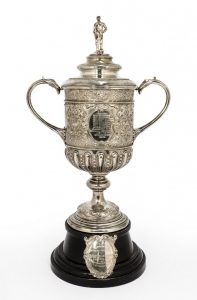
Clapham Rovers FC were one of the leading sporting clubs at the end of the 19th century running both a successful Association Football and Rugby Football Club. Their first football game was against Wanderers in 1865, who were another successful club from the same period, winning five of the first seven FA Cup finals between 1872 and 1878. Wanderers too still have a Sunday League side running which will no doubt feature in a future visit to “the smoke”.
Clapham Rovers were one of the fifteen entrants to the inaugural FA Cup competition in 1871/72 and Rovers Jarvis Kenrick, who later moved to Wanderers, with whom he won three winners medals, scored the first ever goal, the first of his brace against Upton Park in a 3-0 win. They were defeated 1 – 0 by eventual winners Wanderers in the Second Round. They reached the Semi-Finals in 1874 where they were beaten 1-0 by Oxford University who went on to lift the trophy beating the Royal Engineers 2-0 at The Oval. Rovers made the Final in the 1878/79 competition and they were beaten 1 – 0 by Old Etonians through a Charles Clerke goal in front of 5,000 fans at Kennington Oval. The following year they went one better, lifting the famous cup. Rovers journey to the Final began with them beating Romford 7 – 0 in the First Round, South Norwood 4 – 1 in the Second Round, Pilgrims 7 – 0 in the Third Round, Hendon 4 – 0 in the Fourth Round, Old Etonians 1 – 0 in the Fifth Round and then received a bye in the Semi-Final, meaning they would meet Oxford University at the Kennington Oval.
Rovers played in their cerise and grey halved shirts whilst the University team turned out in their familiar blue and white halved shirts. There were well known players on both sides – for Rover, there was Reginald Birkett who represented England at both football and rugby union, in goal, and captain Robert Ogilvie, Edgar Field, Norman Bailey and Francis Sparks, who also won caps for England.
Thanks to the wonders of the internet replicated below is an article about the Final and a curious piece about Oscar Wilde.
The Oxford team that had conquered much-fancied Nottingham Forest in the Semi-Final immediately took the initiative in the Final. Phillips’ early free-kick, given for hands, went within an ace of its intended destination. Then Clapham, recovering their poise after this sudden attack, moved forward in fine style and caused their opponents’ backs many anxious moments.
Lloyd-Jones’s cross was only cleared to outside-left Ram and his shot came back off a post, Lloyd-Jones tried a shot himself which went over the tape and that proved to be the last noteworthy incident of the half.
Oxford, with the wind, carried ail before them in the first few minutes of the second half and immediately forced two corners in quick succession. Play then proceeded so evenly that thoughts of an extra half-hour’s play were being entertained. But with ten minutes to go, King failed to cut out Sparks’ cross and Lloyd-Jones rushed up to shoot between the posts. Birkett, an England international at both football and rugby, moved smartly to save from Childs as Oxford launched a counter-attack, but the Clapham goal was not seriously threatened again.
The myth of Oscar Wilde at the FA Cup Final, 1880 – Oxford University, when they played Clapham Rovers in the 1880 FA Cup Final, were so certain of victory against the lowlife of London SW11 that they called in the great Irish playwright – then 26 – as a “trophy striker” who would raise the game to exquisite levels of artistic sophistication. Unfortunately, Wilde was wholly unconvincing as a footballer. He drifted languidly round the edges of the pitch in blue satin culottes, carrying a lily. Play was held up as he upbraided the midfield in drawling epigrams (“To muff one pass, Mr Hallsworthy, may be regarded as a misfortune; to muff two looks like perversity”). A crucial cross in the 89th minute landed at his feet, but he disdained to kick the ball. “Take that horrid thing away,” he said to the goalkeeper, “before it soils my loafers.” Asked afterwards by reporters for his view of the game, he replied: “Twenty-two men struggling to possess a bladder of air – the perfect metaphor for the London marriage market.”
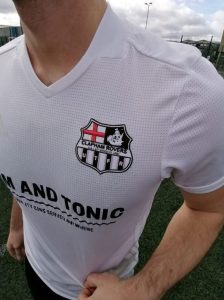
Rovers continued to compete, though unsuccessfully in the FA Cup through to 1889 by which time the professional clubs of the north were starting to dominate the competition. There were still reports of Clapham Rovers playing through to the First World War which is when the original club was eventually dissolved. Since 1996 a Sunday league team has been in existence which is the incarnation I would watch today. The Club with a nod to its past carries on the badge, ‘FA Cup winners 1880’.
The match was played on AstroTurf and there was a strong wind blowing down the pitch which spoilt the game. It was a good end to end affair which saw Ladzio score the first in the second half against the wind. With the wind at their backs Clapham pressurised Ladzio and they finally equalised ten minutes from time, to take the game to penalties which Ladzio won 6 – 5. James Cunnah was the hero, saving the 12th penalty. To show how windy it was, some penalties required someone to hold the ball in place (rugby union style), so the kicker could take it!
PS. Many thanks to Rovers for inclusion in the team picture. Nearest I’ll get to being in a FA Cup winning line-up!
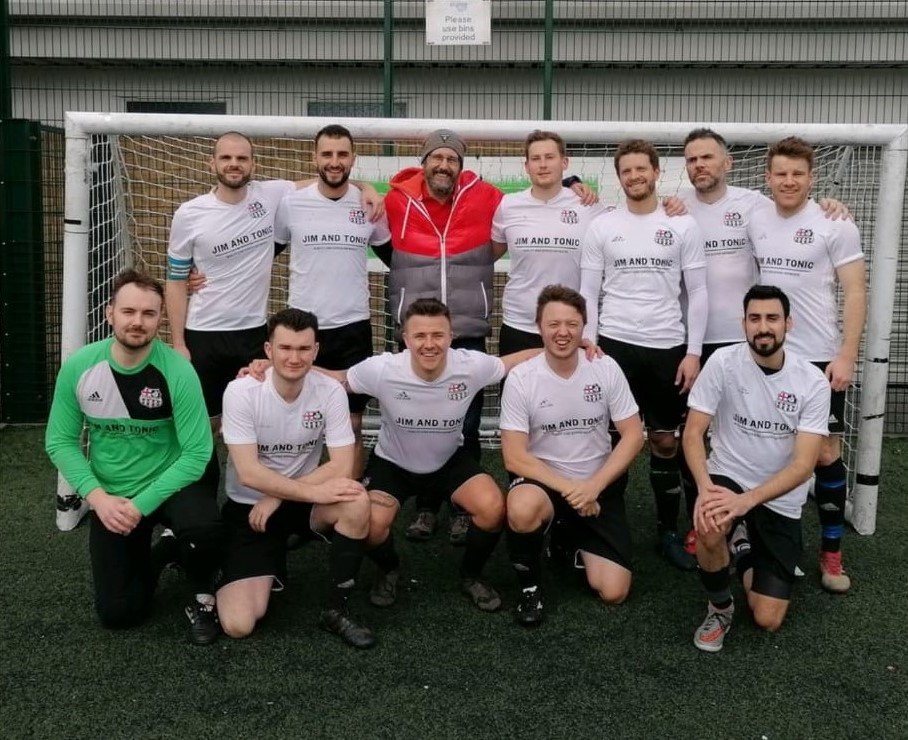
Sunday 23 February 2020
Frank Bluntstone Cup
Clapham Rovers 1 (Smith) Ladzio 1 (Sam) [Ladzio won 6-5 on penalties]
Venue: Aspire at Southfields
Attendance: 2
Clapham Rovers Squad: Sprotson, Ford, Booker, Cerenko, Hill, Keenan, Kew, Louis, McKee, Nicou, Smith.
Ladzio Squad: Cunnah, Goldwater, Jack Gravestock, Joe Gravestock, Martinez, Persson, Robbins, Sam, Stevenson-Steels, Sweeney, F Gravestock, M Gravestock
Steve Blighton
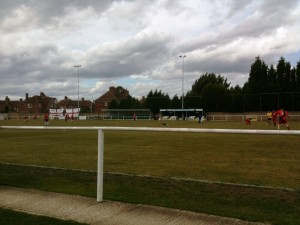
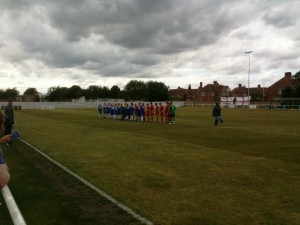 So to the new season and Hemsworth’s opponents today in the FA Cup are Tadcaster Albion. Albion play in the league above The Wells in the Baris NCEL Premier Division. Yet, despite the difference in league status, there was a hint of an upset in the air, as Tadcaster came into the game having lost their opening two league fixtures, whilst Hemsworth had taken a maximum six points from their start to the campaign in Division One.
So to the new season and Hemsworth’s opponents today in the FA Cup are Tadcaster Albion. Albion play in the league above The Wells in the Baris NCEL Premier Division. Yet, despite the difference in league status, there was a hint of an upset in the air, as Tadcaster came into the game having lost their opening two league fixtures, whilst Hemsworth had taken a maximum six points from their start to the campaign in Division One.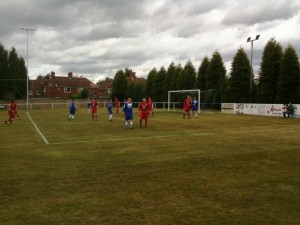 The second half brought no respite for the home team and the inevitable happened on 67 minutes when Carl Stewart beat the offside trap and put the visitors into a 1-0 lead. Stewart killed off Hemsworth’s Cup dream less than 10 minutes later, when he unleashed a long range effort that evaded the despairing dive of Walstow. The Wells continued to press and did get a consolation goal with 7 minutes remaining from Andrew Hayward. However, an equaliser didn’t materialise and in truth Tadcaster deserved their 2-1 win to progress to the FA Cup Preliminary Round and a tie away to Pontefract Collieries in the first week of September.
The second half brought no respite for the home team and the inevitable happened on 67 minutes when Carl Stewart beat the offside trap and put the visitors into a 1-0 lead. Stewart killed off Hemsworth’s Cup dream less than 10 minutes later, when he unleashed a long range effort that evaded the despairing dive of Walstow. The Wells continued to press and did get a consolation goal with 7 minutes remaining from Andrew Hayward. However, an equaliser didn’t materialise and in truth Tadcaster deserved their 2-1 win to progress to the FA Cup Preliminary Round and a tie away to Pontefract Collieries in the first week of September.